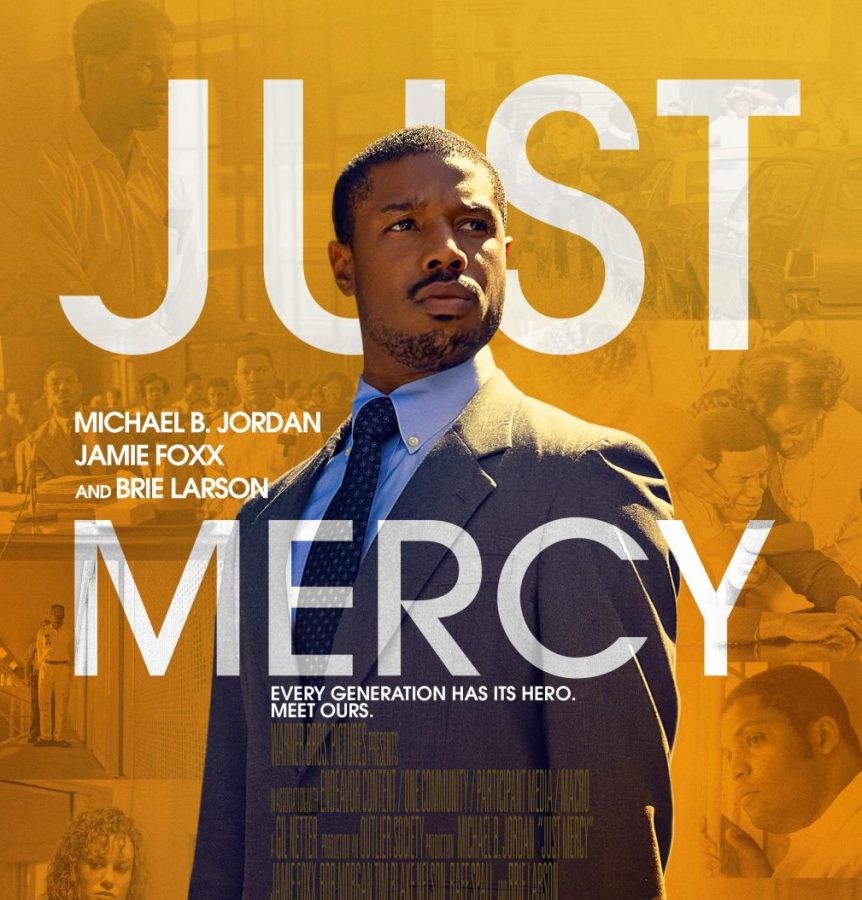‘Just Mercy’ provides accurate depiction of fight against wrong convictions
‘Just Mercy’ stars Michael B. Jordan and Jamie Foxx and seeks to show viewers the fight that Harvard Law School graduate Bryan Stevenson partook in to reverse the sentences of convicts on the Alabama death row. Stevenson’s fight, however, was against much more than just one corrupt law office.
February 6, 2020
Recently, I was lucky enough to see “Just Mercy” at Midtown Art Cinemas on a school field trip. The movie follows real-life Harvard Law School graduate Bryan Stevenson, played by Michael B. Jordan, as he moves to Alabama with federal funds to set up a public defense system called the Equal Justice Initiative. Stevenson specializes in defending convicts awaiting execution on death row, most of whom are black and convicted on minimal evidence or a lack of proper defense.
“Just Mercy” uplifted me and made me feel hopeful for the future as Stevenson gained momentum and built a strong case for the wrongly convicted men. It educated me on a topic that I was originally less familiar with and showed me how the corrupt ways of the South persisted into modern times.
By 1987, the movie’s setting, there had never been a convict exonerated of their punishment once sentenced to death in Alabama. One of Stevenson’s first cases was that of Walter McMillian, played by Jamie Foxx, who had been hastily convicted for the murder of an 18-year-old white woman. McMillian had dozens of witnesses with him at the time of the alleged murder, and he was sentenced based on the “eyewitness” testimony of a life sentenced convict. The evidence used against McMillian was inconclusive and scarce, while that of his innocence was staggering.
“Just Mercy,” directed by Destin Daniel Cretton and based on the book written by Stevenson, is an honest depiction of the reality of Stevenson’s fight against an Alabama county full of prejudiced policemen, racist citizens and a justice system quick to judge McMillian by his skin color. The movie highlights the seemingly impossible and untraveled road on which Stevenson embarks in order to reverse the corrupt South, even in the late 1900s.
An important aspect that emerged as the film progressed was the notion that Stevenson and his Equal Justice Initiative were going up against not just a few cases on the Alabama death row, but the entire racist justice system and history of the United States. This gives “Just Mercy” a particular gravity in society today because of our prevailing problems with racism and the current White House administration that seemingly condones it.
The movie comes at a time when the justice system is under scrutiny for its history of bias decision-making and unfair trials, a problem that still persists today. According to the American Constitution Society in 2018, more than 95 percent of cases that resolve in a conviction are the result of plea bargains. The way that the justice system sweeps convictions under the rug is unacceptable in any time period, especially this one.
On the website for “The New Jim Crow,” a book by Michelle Alexander that outlines the criminal justice system’s flaws and targeting of minorities, it explains that the United States is in a period governed by a “caste-like system” that has lead to “millions of African Americans locked behind bars and then relegated to a permanent second-class status — denied the very rights supposedly won in the Civil Rights Movement.” This idea is heavily scrutinized in “Just Mercy.”
However, Stevenson’s success is evident in the current rate of exonerated criminals. For the third year in a row the number of exonerations in the United States has hit a record high. A total of 166 wrongly convicted people whose convictions date as far back as 1964 were declared innocent in 2016, according to a report from the National Registry of Exonerations. This trend can partly be explained “by a growing trend of accountability in prosecutorial offices around the country.”
“Just Mercy” is extremely relevant in the world today because of its commentary on the problems of the justice system and the message it promotes: a message of hope and positivity that stems from Stevenson’s success in acquitting the men through legal means is one that can resonate in the minds of youth to hopefully one day follow in Stevenson’s footsteps. The movie was powerful enough to remain in my mind for hours after the final credits rolled in, and even enough to change my outlook on life in our complacency with the justice system. All in all, “Just Mercy” is a modern film classic and provides a necessary history lesson.








